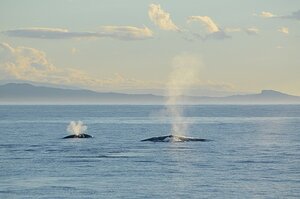~ecology-news-biolog | Bookmarks (445)
-
Unraveling the mystery of rarely seen blue whale calves
Only two blue whale births have ever been recorded in human history, both decades ago. This...
-
Cuttlefish adjust their shape and color to suit conditions when seeking prey, study shows
A small team of marine biologists at the University of Bristol, in the U.K., working with...
-
'Devil'-like flower with 'horns' found in Texas is new species: Its location is secret
In a rugged stretch of desert in one of the nation's most remote national parks, a...
-
Virtual markers enable highly accurate multi-animal pose tracking in crowded environments
Studying the social behavior of animals in their natural environments is necessary for advancing our understanding...
-
Rare rearing: Japanese collaboration to save near-extinct White-bellied herons in Bhutan takes wings
The White-bellied Heron (WBH), the world's second-largest heron, is a symbolic bird for the people of...
-
'Dumb birds' no more: Emus and rheas are technical innovators, say researchers
Large birds—our closest relations to dinosaurs—are capable of technical innovation, by solving a physical task to...
-
Research shows turtles change nesting patterns in response to climate change
New research shows that turtles are responding to climate change by nesting earlier. Researchers monitoring nesting...
-
10 new sponge species discovered in Hawaii's Kāne'ohe Bay
In a succession of studies published this week and last month in the journals PeerJ and...
-
Fossil study reveals that palm trees once thrived in subarctic Canada
A new study by Connecticut College provides strong evidence that palm trees once thrived in subarctic...
-
Proactively exposing ecosystems to mild environmental stressors offers protection, study finds
Mild, proactive exposure to environmental stress can help biological communities resist severe disturbances and maintain genetic...
-
We can farm more seafood while minimizing its impact on biodiversity, research shows
Humanity can farm more food from the seas to help feed the planet while shrinking mariculture's...
-
Adult great apes show enhanced memory for social events
Researchers from the Max Planck Institute for Evolutionary Anthropology in Leipzig, Germany, have examined how social...
-
Resilient algae darken glacier surface and may speed up Greenland ice melt, study finds
Glaciers are huge white ice masses that can reflect a lot of sunlight. However, especially where...
-
Threatened Peruvian plant discovery highlights the power of citizen science
The discovery of a new species in the Andean cloud forests of northern Peru has reinforced...
-
Orchid's nutrient theft from fungi sheds light on photosynthesis-parasitism continuum
Most orchids live in a symbiotic relationship with fungi in their roots: The plants provide sugar...
-
From the Ice Age to now: How repeated invasions have shaped New Zealand bird life
New University of Otago—Ōtākou Whakaihu Waka research shows Aotearoa has been increasingly accepting new bird species...
-
Experiments show wild fish can recognize individual divers
For years, scientific divers at a research station in the Mediterranean Sea had a problem: at...
-
Fossils reveal rapid land recovery after end-Permian extinction around 252 million years ago
Tropical riparian ecosystems—those found along rivers and wetlands—recovered much faster than expected following the end-Permian mass...
-
Autonomous robots track plankton in the Arctic Ocean
It's spring, the sun is shining and something is about to happen with the plankton in...
-
Q&A: Why 'leaky' plants could accelerate climate change
Plants play a key role in regulating Earth's climate, but recent research suggests that rising temperatures...
-
Lethal second-generation rat poisons are killing endangered quolls and Tasmanian devils
Humans have been poisoning rodents for centuries. But fast-breeding rats and mice have evolved resistance to...
-
A century of extra carbon dioxide boosts photosynthesis in tropical trees
The concentration of CO2 in the atmosphere is rising rapidly, with numerous negative consequences for the...
-
Animals as architects of the Earth: First global study reveals their surprising impact
Animals are not just inhabitants of the natural world—they are its architects. A new study led...
-
Birds traversing longest distances across Americas found to be at highest risk
Scientists with the National Audubon Society published research in Nature Ecology & Evolution that will help...



















